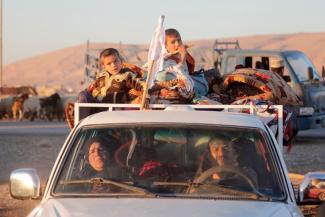Displaced persons
Ignored people
 Keles/picture-alliance/AA
People fleeing from clashes between the Iraqi army and ISIS terrorists in Mosul in early November.
Keles/picture-alliance/AA
People fleeing from clashes between the Iraqi army and ISIS terrorists in Mosul in early November.
Forced displacement has reached record numbers. The UN refugee agency UNHCR estimates that more than 12 million people were newly displaced in the past year. More than half of all refugees the UNHCR is responsible for come from three countries: Syria, Afghanistan and Somalia. For the second consecutive year, Turkey has been hosting the largest number: 2.5 million refugees.
In the past, displaced people used to become temporary refugees in neighbouring countries until they could safely return home. Morten Bøås of the Norwegian Institute of International Affairs warns, however, that war dynamics have changed and conflicts drag on without an end in sight. Consequently, host communities face high costs in the long run. The result is competition for scarce resources, with increasing tensions between refugees and poor host communities.
To some extent, refugees mean business opportunities, Bøås says. For example, traders in the Sahel town of Agadez in Niger sell goods to refugees at high prices. Transporting people becomes ever more important and blurs into people smuggling. Crime such as human trafficking can intensify too, according to Bøås. Moreover, crime can increase too.
High refugee numbers have an impact on global affairs, Bøås says. For example, Turkey has gained enormous political influence because it can restrain the number of people who flee to the EU.
Displacement creates specific vulnerabilities, mostly due to a lack of social protection. Internally displaced persons (IDPs) hardly fare better than cross-border refugees, but they get much less attention because they are not refugees by definition, says Elisabeth Ferries of Georgetown University in Washington DC. Refugees are considered an international issue, she says, while IDPs are a domestic one. There is no international response to internal displacement. According to the UNHCR, however, about 8.6 million individuals were displaced within their own countries last year.
Ferries argues that host communities need support, whether they take in refugees or IDPs. Humanitarian aid is not enough, she adds, as long term solutions are needed. As international borders are becoming harder to cross, IDP numbers are probably growing – and their fate worsening, Ferries says. A serious problem in her eyes is that statistics are unreliable, with population growth compounding the problem.
Esther Meininghaus of the Bonn International Center for Conversion (BICC) agrees. She says better data is needed to monitoring the effectiveness of aid. Moreover, she calls for mechanisms of accountability. She concedes, however, that aid delivery is a more urgent task in emergencies than data collection.
According to Meininghaus, it makes a difference whether people flee from danger and can choose their destination or whether they are forcibly relocated to a place. Making matters worse, many persons are displaced more than once. All too often, they lack accommodation and support. Many become mentally and physically exhausted, as Meininghaus told a BICC-conference in Bonn in November.
BICC director Conrad Schetter says that refugees’ aspirations and experiences are often ignored, even though they would matter in attempts to build and keep peace. In his eyes, it is wrong to see them basically as masses who will return home once there is no more war, since they must be involved in bringing about peace.
Floreana Miesen
Link
UNHCR, 2016: Global trends. Forced displacement 2015.
http://www.unhcr.org/statistics/unhcrstats/576408cd7/unhcr-global-trends-2015.html

